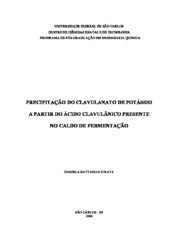Precipitação do clavulanato de potássio a partir do ácido clavulânico presente no caldo de fermentação
Resumo
Clavulanic acid is a potent inhibitor of many β-lactamase enzymes producing bacteria, which attribute bacterial resistant against cephalosporins and penicillins. The combination of CA with amoxicillin is the most successful example, that clavulanic acid have the ability to enhance the effectives of β-lactam antibiotic, which was β-lactamase sensitive, allowing the use of amoxicillin in treatment of a lot of diseases. Clavulanic acid is obtained by a fermentation method from various microorganisms belonging to many Streptomyces strains such as Streptomyces clavuligerus. CA itself is an unstable hygroscopic oil which is not used for the preparation of pharmaceutical compounds, for this suitable salts are more appropriated. Among these compounds potassium clavulante is the most stable compound which is normally used for pharmaceutical preparations. In the present work a precipitation of potassium clavulanate starting from the clavulanic acid present in the fermentation broth (cultivated at DEQ-UFSCar) was proposed. Therefore were necessary preliminary studies such as the characterization, monitoramment, standardization of CA (Clavulin®) and improvement of the previously purification steps employed before precipitation step. The directly precipitation (R0) which occurred the reaction of CA with potassium 2-ethyl hexanoate resulting in the potassium clavulante and the precipitation with an intermediate step which occurred an previously reaction of CA with the t-octylamine (R1) allowing a formation of a amine salt of CA (stable intermediate) that afterward it was reacted with the potassium 2-ethyl hexanoate for the formation of potassium clavulanate (R2) were evaluated. The studied reactions were optimized through by response surface methodology (experimental design) in order to permit maximize the yield and to evaluate the stability of the potassium clavulanate precipitated. The results obtained were excellent and demonstrated that the reaction of precipitation employed is very appropriate to be used as the final stage of the process of AC purification from fermentation broth, allowing to obtain a raised yield of the potassium clavulanate associated to a high purity.
